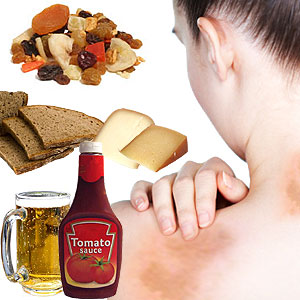Yeast Allergy

Yeast is a microorganism belonging to a fungi family. Yeast is found in the body and also in several food items that we eat. Typically the amount of yeast in the body does not cause any sort of imbalance. But when the amount of yeast gets too much, the body develops allergic symptoms to a protein present in the yeast. The body releases histamines and antibodies to neutralize this yeast protein. Read more to find out about yeast allergy symptoms and possible treatment options.
Yeast allergy
Yeast is primarily used to ferment food items. Foods that contain yeast include bread, wine, beer, cheese, vinegar, dried fruits and mushrooms. Keep away from red meat, leftover food and refined sugar as they are high in yeast. Instead include plenty of plain yogurt, fresh vegetables, garlic and citrus fruits.
Common symptoms of yeast allergy
- Headache
- Itchy nose
- Sneezing
- Sore throat
- Itching in vagina associated with whitish discharge
- Nasal congestion
- Skin rash
- Digestive problems like bloating and constipation
- White coated tongue
Those suffering from allergy to yeast are likely to notice sneezing and runny nose with symptoms typical of asthma. Often an allergy to yeast results in abdominal pain and diarrhea and flatulence. An eczema-like skin condition is also another symptom of yeast allergy.
One should be vigilant about what is causing the reaction. If it is due to the yeast in the food, symptoms start surfacing few minutes (some times few hours) after consuming the yeast. If allergy is caused by excess yeast in the body, establishing a connection between symptoms and yeast allergy may become a hard task. The reason being, similar conditions are experienced in other health problems too.
Yeast allergy treatment
Suffering from allergies can be tedious; they rob joy out of your life. Identifying the causes rather than concentrating on symptoms is more logical and first step towards treatment. If yeast in the food is the culprit, the best way to treat allergy is to eliminate yeast containing food. But how do we know that we are specifically allergic to yeast in the food? Self check is the best bet. You need to observe and examine
your body reactions to yeast containing food items. If you feel fatigued, tired or develop sore throat after consuming yeast containing food, fix the problem by paying attention to your diet.
Diet alterations should be combined with anti fungal medication to treat allergy caused by yeast over growth (candida) in your body. A weak immune system, hormonal changes, continuous use of antibiotics, or stress may trigger candida. Yeast allergy if untreated may aggravate and cause serious bacterial infection of blood. Hence it is appropriate to refer to your doctor for diagnosis and medication. Finally eat right and exercise hard, it revs up your whole system, which in turn boosts your immunity levels. Strong immune system keeps allergies at distance.
Top of the Page: Yeast Allergy
Tags:#yeast allergy #yeast allergy symptoms #yeast allergy treatment.
 Pelvic Floor Dysfunction
Pelvic Floor Dysfunction Bladder problems in women
Urinary Incontinence
UTI - Urinary Tract Infection
Feminine Hygiene
Yeast Allergy
Other health topics in TargetWoman Women Health section:
General Women Health

Women Health Tips - Women Health - key to understanding your health ...
Cardiac Care
Women's Heart Attack Symptoms - Identify heart problems...
Skin Diseases
Stress Hives - Red itchy spots ...
Women Disorders
Endocrine Disorder - Play a key role in overall wellbeing ...
Women's Reproductive Health
Testosterone Cream for Women - Hormone replacement option ...
Pregnancy
Pregnancy - Regulate your lifestyle to accommodate the needs of pregnancy ...
Head and Face
Sinus Infection - Nearly 1 of every 7 Americans suffer from ....
Women and Bone Care

Slipped Disc - Prevent injury, reduce pain ...
Menstrual Disorders
Enlarged Uterus - Uterus larger than normal size ...
Female Urinary Problems
Bladder Problems in Women - Treatable and curable ...
Gastrointestinal Disorders
Causes of Stomach Ulcers - Burning feeling in the gut ...
Respiratory Disorders
Lung function Test - How well do you breathe ...
Sleep Management

Insomnia and Weight Gain - Sleep it off ...
Psychological Disorders in Women
Mood swings and women - Not going crazy ...
Supplements for Women
Women's Vitamins - Wellness needs...
Natural Remedies

Natural Diuretic - Flush out toxins ...
Alternative Therapy
Acupuncture Point - Feel the pins and needles ...
Women Health Directory
Top of the Page: Yeast Allergy
Popularity Index: 101,022

